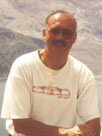Joseph Mikula
I’m wandering through Saint Michael’s Cemetery in Homeville, PA. My father’s buried here, my grandparents, and we’ll lay our mother to rest here when her time comes. It’s a nice place – well-kept, green and wooded. It’s a beautiful spring day, the sky blue and not a cloud. I put new flowers on the graves, then walk around the grounds. These were people I knew as a child – tough and strong. Working-class Poles, Slovaks, Ukranians. The men worked in the mills and factories, the women stayed home to raise the kids and hold the household together.
Here’s Joseph Mikula – 1910-1966. I remember you, Joe. One day you were walking around, gruff and loud, a real joker. Getting ready for a fishing trip in a few days up to Pymatuming Reservoir. Then ... boom, on the ground, heaving like a hooked fish on land, eyes bugged out, skin blue-gray, dead before they got you to the hospital. You were looking forward to that trip – a little fishing, a lot of beer and booze with the boys. You were a lot more fun than my own parents. I’d come by Saturday mornings with the paper and you’d be under the hood of one car or another, take the paper from me, hands covered with grease. How about a beer, you’d say? How old are you now? Sixteen, huh? Old enough for pussy, old enough for beer. I’d just turn red and look down at my feet.
I hear you stirring around down there. Forty years gone and it still doesn’t sit well with you. You were so full of life And you too, Mary – 1913-1996 -- beloved wife and mother. They could have added long-suffering. It was no secret he drank too much, though he was a happy drunk, even the time he wrapped the car around the light pole up the street. Mary, you lived a long life and all you want now is to rest, but he won’t let you. Always on you, wasn’t he? Mary, wherz ma goddamm boots? Mary, wherz ma lunch, I’m late fa work, fa christsakes.
Five days a week, the same thing -- You hand him his black steel lunch box; the screen door bangs as he heads out to his ’62 Chevy Impala and the 4 to 12 shift at O.H. 5. Roast beef and American cheese on Jewish rye, a Vlasic pickle, an apple and two Snicker’s bars. Every day for 30 years. He grabs a coffee and glazed donut in the mill cafeteria before the daily meeting for the afternoon crew and reads his Post-Gazette while the super drones on about quotas and the problem with the temperature gauges and the batches being too cold. What’s there to hear that he hasn’t heard a million times already?
Give it a rest, Joe. O.H. 5 has been shut and gone for 20 years. Most people around here wouldn’t know an open hearth from a fireplace. Same with the Big Shop, the Machine Shop, the 160” Plate Mill. All gone, Joe. You should see the place now. Stores and parking lots. Townhouses along the river. Can you imagine? But it’s not like what you’re thinking, it’s real nice, no more dirt and noise. These townhouses are nothing like the shacks that used to be down there, before they tore them down in the ‘40s to expand the mill. Doctors and lawyers live there now, folks with two dogs and no kids. What the hell do they know about what went on here, how goddamn great it was? About all that’s left of the mill is the big plate press in the middle of a parking lot. Too big to move, so they put a little sign up and called it historic. Hey, Joe, there’s a coffee shop where you can get a latte and a chocolate croissant. Know what a latte is, Joe? A croissant? See what I mean. It’s not your world anymore; the kids are all gone -- Baltimore, New York, Alaska. From the looks of your grave I bet none of them ever visits with flowers.
You know what I’m going to do now, Joe? I’m going to get away from all this sunlight and fresh air, drive down the hill to Coral Lanes, sit with the cigarette smoke and stale sweat-and-popcorn smell and listen to the balls roll down the lanes. And I’ll have a beer or two, Joe. After all these years, just for you.
from Steel Valley


